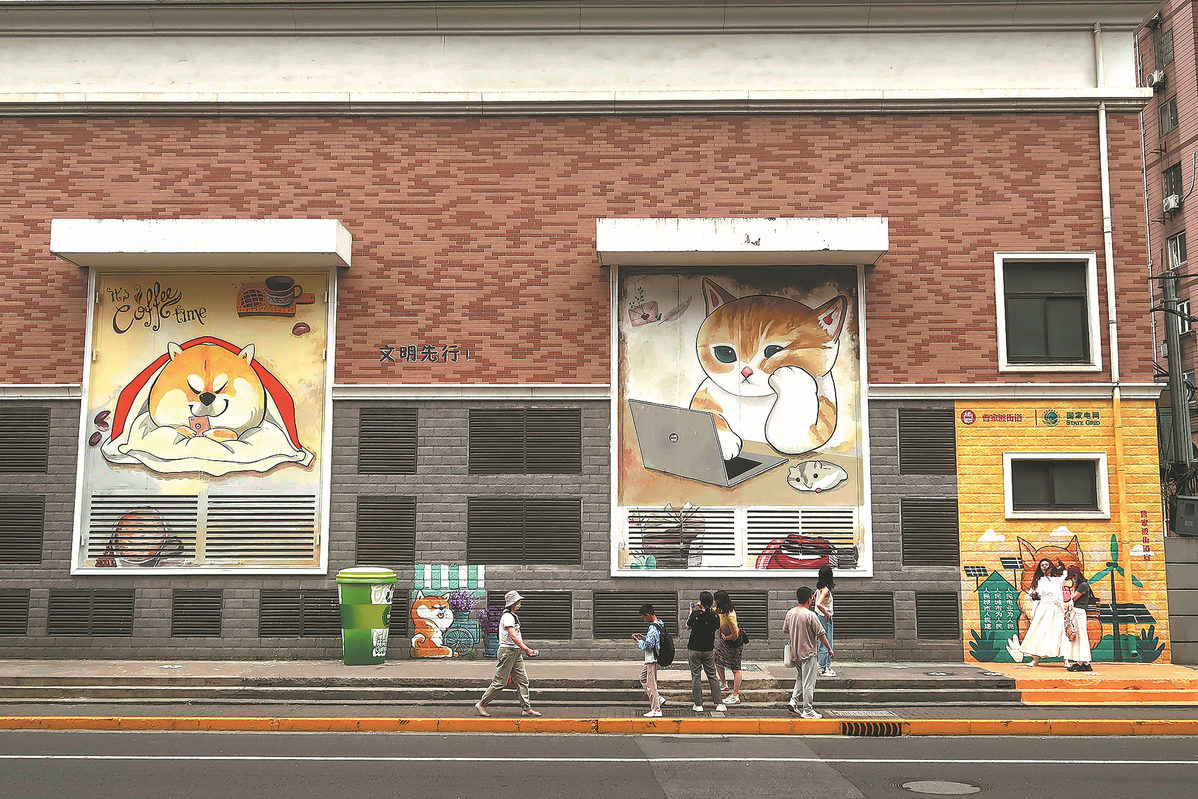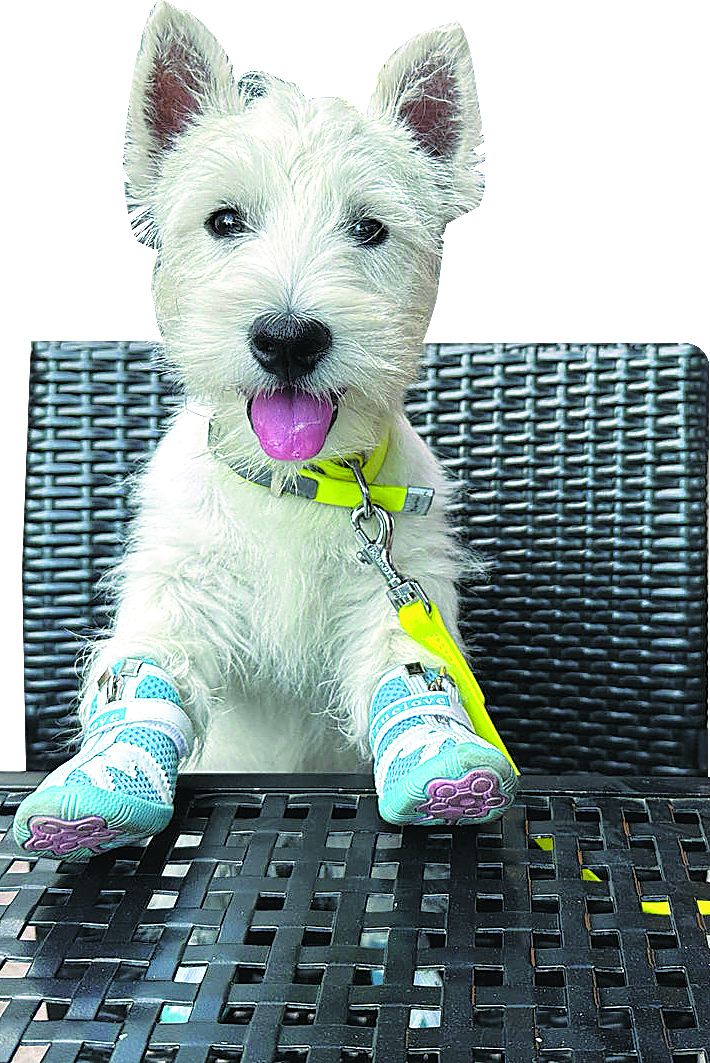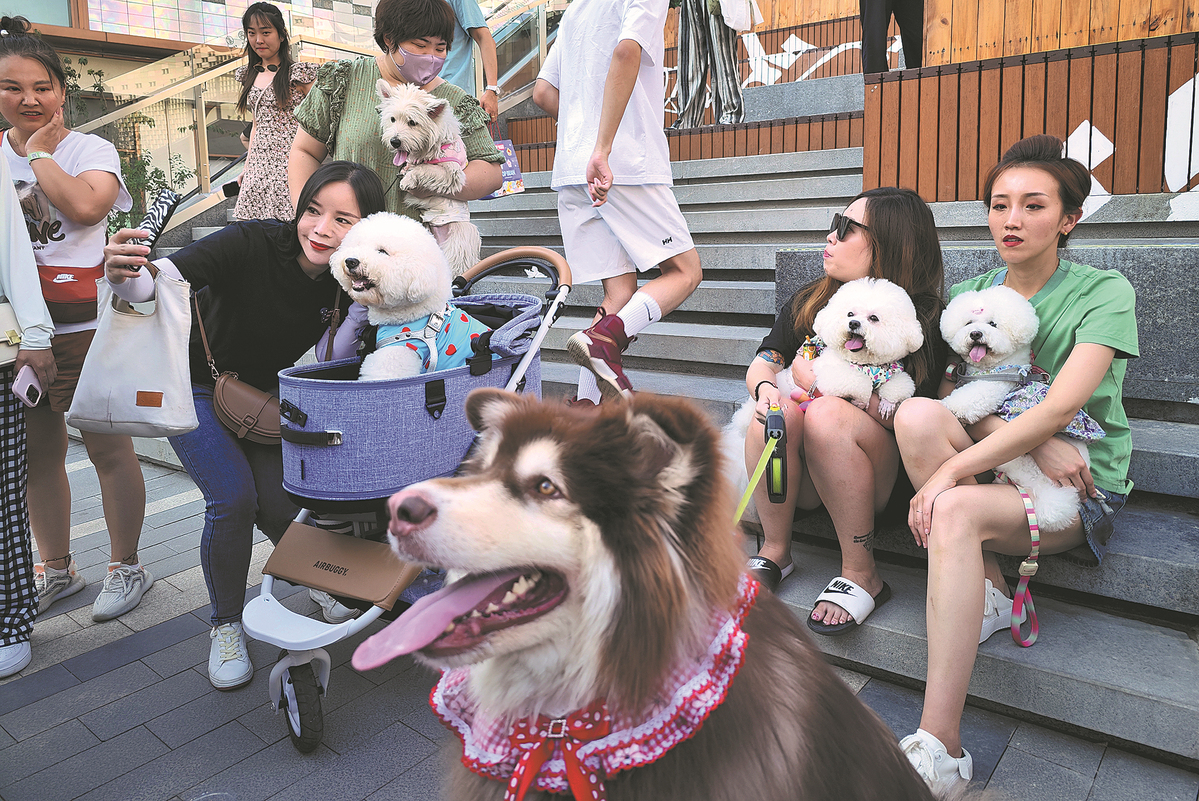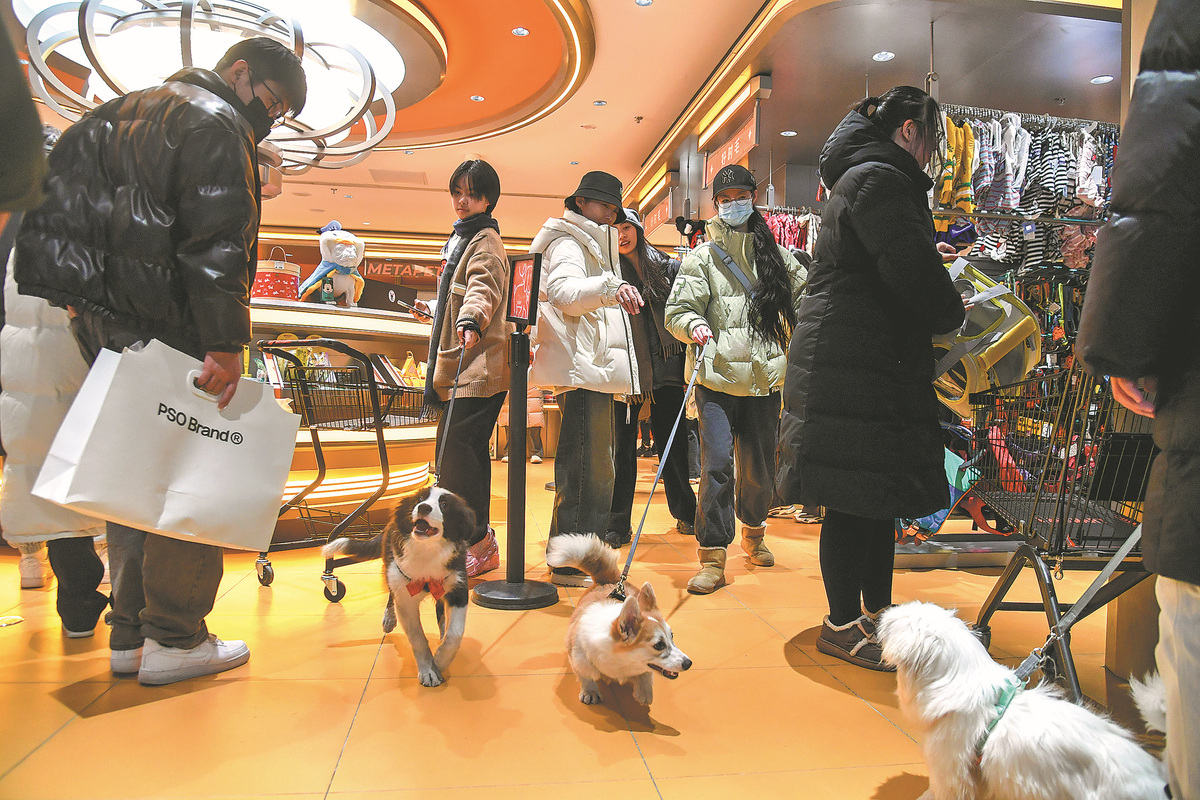Cakes to couture, pampered pets a growing breed

Passersby walk down a street with pet-themed walls in Shanghai in June. CHINA DAILY
In a bakery in Shanghai, Xu Ling beams as she picks up a cake decorated with bone-shaped cheese. It's not for one of her human friends, but to celebrate the birthday of her beloved border collie, Laksa.
The cake, weighing 350 grams and costing 168 yuan ($23), is made with quality ingredients including chicken, duck and egg yolks. For Xu, it's worthwhile splurging on the treat to make her dog's birthday special.
The increased pampering of animal companions in China has given rise to a booming economy catering to pets' every need, with premium food products, accessories, healthcare services and experiences previously reserved for humans.
At the forefront is the emerging haute cuisine craze, with owners enthusiastically serving their pets multicourse meals tailored to the pets' tastes.
While pet bakeries have been popping up over the past decade to meet this burgeoning demand, large mainstream brands entering the market speak volumes about how hot pet care has become.
Traditional bakery chains are riding this wave, with Holiland recently launching pet cakes decorated with edible prints and animal-safe cream. The cakes, which cost 168 to 218 yuan, have attracted a large number of pet owners seeking to make their furry companions' birthdays a memorable occasion.
Since their introduction in February, the special cakes have been in short supply and pet owners now need to make an order one day in advance. On HolilandPet's official shop on the online shopping platform Taobao, sales records showed that more than 2,000 people bought the cakes in the last month. Most buyers are content with their purchase and are pleased the big-name brand endorses the safety of the cakes.
"When I learned such a big brand had begun making cakes for pets, I couldn't wait to let my baby have a taste," said Xu. "I've made cakes for Laksa myself, and I know how hard it is to make a well-balanced cake that suits a pet's taste. The money was well spent. My pet taught me how to love again, and I want to give him a better life."

A dog waits to dine at a pet-friendly restaurant in Beijing in July. LIU ZHE/CHINA DAILY
Animal attraction
Although a luxurious pet lifestyle may seem excessive to some people, it reflects a large cultural shift in modern Chinese society toward treating animal companions as members of the family.
Beyond haute cuisine, this phenomenon has expanded into designer pet apparel, home customization services, and even pet fashion shows.
During a recent pet fashion show in Shanghai, over 300 cats and dogs dressed in glamorous outfits were paraded on a runway by their owners when 12 pet brands launched their newest collections at the Shanghai Fashion Center in the Yangpu district.
"We found that the emotional connections between modern urban pet owners and their animal companions have deepened immensely. Pet owners have begun to pay more attention to their pets' spiritual demands in addition to their basic physiological needs. So we tried to integrate the pets and fashion," said Zhang Xin, executive deputy manager of the Shanghai Fashion Center.
The center intends to attract more upstream and downstream brands in the pet industry in the future, so that the pet "ecosystem "can congregate in Yangpu, Zhang added.
Wu Haiping, the founder of PetMrWu pet clothing, sees a vast untapped market as people's demand for pet companionship grows.
Wu is a costume designer and owns a dog and a cat. He set up the brand and commercialized it in 2021, initially because he was not satisfied with the majority of pet clothing available in the market.
"At first, pet clothing was just smaller versions of what humans were wearing. I could see pets were uncomfortable wearing such clothes," Wu said.
His custom-made pet clothing, which sells for 300 yuan to thousands, uses antimicrobial and natural fabrics and takes into consideration animal exercise habits that differ from humans, or even between species.
Shanghai-based design and development company Dingchong provides services to customize home environments so pets can live more comfortably. The company said it specializes in high-end homes for pets.
"Our customers are mainly singles, newly married couples, DINK (double income no kids) families, and those whose children have grown up and moved out. They own large living spaces, and they're willing to spend on customized living spaces to make their pets more comfortable," said co-founder Qiu Limin.
The brand works on creating independent spaces dedicated to the pets' needs that include medical areas, isolation zones, and play areas. The designs are made after doing research on aspects such as feline ergonomics, with "customer unit prices" running to at least five-figure sums.
"For example, we'll make lower furniture for Munchkin cats who can't jump as high, or install more vertical climbing structures for active breeds like the Devon Rex," Qiu said.
Pet food makers, apparel designers, and service providers have also found profitable niche markets catering to owners' indulgence of their animal companions. On Xiaohongshu, the Chinese lifestyle platform, videos of unboxing pet supplies or reviewing pet food garner millions of views.

Residents with their pets pose for photos during a pet party held by a shopping mall in Tianjin in July. TONG YU/CHINA NEWS SERVICE
Stepping out
Beyond high-end experiences, pets worldwide have been granted more accessibility and are being welcomed in public spaces that were previously off-limits. Many cities have made concerted efforts to upgrade parks, plazas, and other public places to be pet-friendly with amenities such as drinking fountains, dedicated pet zones, and waste disposal stations.
Shops have also followed suit by designating pet-friendly outdoor seating areas and offering specialized menus or treats for canine and feline patrons.
Starbucks is one of the pioneers in this area, introducing Puppuccinos — whipped cream in an espresso cup — for dogs in their pet-friendly spaces. The coffee giant has also collaborated with pet lifestyle brands on accessories like the popular cat paw-shaped tumblers. Manner Coffee, HeyTea, KFC, and Shake Shack have also launched stores that welcome pets with tailored products and pet toy promotions.
Pets' access to public spaces, legal protection of their rights and welfare, and education and raised awareness of people's responsibilities toward them are core elements and indicators of a pet-friendly society, said Zhou Chunhua, secretary-general of the China Pet Industry Association.
The number of pet dogs and cats in China is estimated to grow from 190 million last year to 210 million in five years, according to the APA Institute's China Pet Industry Annual Report 2023.
The increasing pet population and diverse demands for services are driving the expansion of the pet market.
In 2023, the scale of China's pet market increased to nearly 250 billion yuan with a compound growth rate of 13.1 percent in the past five years, the report said. Food supplies accounted for more than half of the pet market, medical care nearly 30 percent, while services such as grooming and training accounted for 16 percent.

Pet owners shop with their dogs at a pet store in a Beijing shopping mall in January. CHINA DAILY
As societies increasingly care about pets, the pet economy will grow even further and embrace more specialized and lavish products and services, Zhou said. Pet veterinary care, intelligent devices, social platforms, eco-friendly food supplies, and sustainable lifestyles catering to pets are also expected to fuel expansion.
However, even as the sector booms, some questions have been raised about the growing number of premium pet products on offer. Animal welfare advocates have voiced concerns that profits are being put ahead of safety issues and consideration of the pets' well-being.
Zhou said as living standards have improved, owners have become more conscious about their pets' health and welfare and are willing to spend on quality food, medical care, and pampering services. She added that the pet industry has developed full life cycle supply chains around a pet's eating, living, medical and other needs.
However, Zhou believes that regulatory oversight is still insufficient with legal frameworks incomplete. Other areas of concern in the pet industry include a shortage of quality standards, fragmented multiagency governance, unregulated breeding and sales of pets, and a lack of social responsibility for pet ownership.
Addressing these issues and others will require government regulation, industry self-discipline, and public education, she said.
Photos
 People fly Kongming lanterns to celebrate New Year of calendar of Dai ethnic group
People fly Kongming lanterns to celebrate New Year of calendar of Dai ethnic group People savor beautiful sights of spring flowers across China
People savor beautiful sights of spring flowers across China Improved ecological environment attracts common cranes to Karamay, NW China's Xinjiang
Improved ecological environment attracts common cranes to Karamay, NW China's Xinjiang Protection of Erhai Lake in SW China's Yunnan yields economic benefits
Protection of Erhai Lake in SW China's Yunnan yields economic benefits
Related Stories
- China's top court calls for responsible pet ownership
- As Spring Festival approaches, surging demand for pet care leads to price hikes
- Cities strengthen dog laws in wake of attack
- New pet services emerge in Nanning, S China's Guangxi
- Pet hotels do roaring holiday trade
- Pets take to the roads and air with their owners
Copyright © 2024 People's Daily Online. All Rights Reserved.





